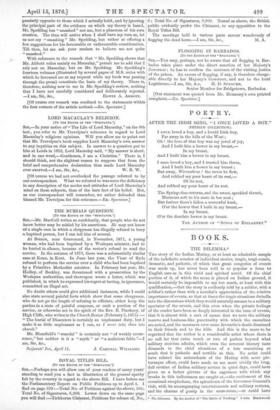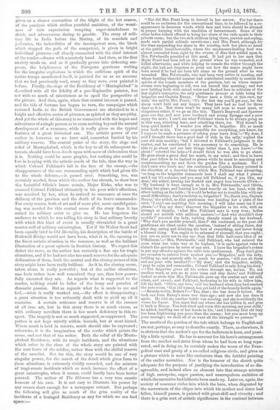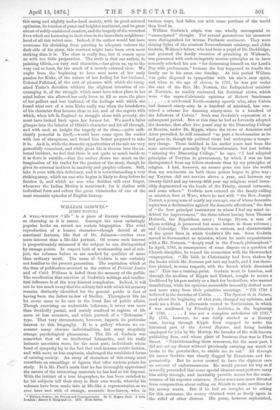BOOKS.
THE DILEMMA.*
THE story of the Indian Mutiny, or at least an admirable sample of the indefinite number of individual stories, tragic, tragi-comic, dramatic, and pathetic, of which that great congeries of events was made up, has never been told in so popular a form to English ears as in this vivid and spirited novel. Of the chief portion of it, of which the scene is placed on Indian ground, it would certainly be impossible to say too much, at least with this qualification,—that the story is evidently told by a soldier, with a soldier's rather than with a novelist's appreciation of the relative importance of events, so that at times the tragic situations dwindle into the dimensions which they would naturally assume to a military spectator of the events, and this even when the private feelings of the reader have been so deeply interested in the turn of events, that it is almost with a sort of amaze that we note the military reserve and business-like punctuality with which the casualties are noted, and the mourners over some favourite's death dismissed to their friends and to the hills. And this is the more to be regretted that the author is a considerable artist where there is no call for that extra touch or two of pathos beyond what military stoicism admits, which even the severest literary taste demands in the chief situations of a tale containing so much that is pathetic and terrible as this. No artist could have related the antecedents of the Mutiny with more pic- turesque effect, could have made us see more vividly the long, dull routine of Indian military service in quiet days, could have given us a better picture of the eagerness with which any breaks in this tediousness are caught at,—the excitement of the occasional steeplechase, the splendours of the Governor-General's visit, with its accompanying entertainments and military reviews, and the charms of gossip in the ' mess-room,--or could have
• The Dilemma. By the Author of "The Battle of Dorking." 8 role. Blackwood.
given us a clearer conception of the blight of the hot season, of the paralysis which strikes youthful ambition, of the weari- ness of vain expectation tempting eager-mindedness to drink, and adventurous daring to gamble. The story of mili- tary life in India before the Mutiny, of its scandals and jealousies, the imbecilities of the incompetent men, the block which stopped the path of the competent, is given in bright individual pictures—all closely connected with the chief interest of the reader—drawn with a masterly hand. And then, as the first anxiety steals on, and as it gradually grows into sickening sus- pense, the helplessness of the European garrisons waiting for the irregular explosions in which the seditious spirit of the native troops manifested itself, is painted for us as no account that we had previously read, many as they were, ever painted it before. Finally, the siege of the Residency of " Mustaphabad " is described with all the fidelity of a pre-Raphaelite painter, but not with so much of minuteness as to spoil the perspective of the picture. And then, again, when that central interest is passed, and the tide of fortune has begun to turn, the campaigns which restored India to the British Government are sketched-in in a bright and effective series of pictures, as spirited as they are pithy. And yet the whole of this story is so connected with the hopes and adventures of a single person as to seem nothing beyond the natural development of a romance, while it really gives us the typical features of a great historical era. The artistic power of our author is, however, as we have said, somewhat limited by his military reserve. The central point of the story, the siege and relief of Mustaphabad, which is the key to all its subsequent in- terests, should have been dwelt upon with more of elaboration than it is. Nothing could be more graphic, but nothing also could be less in keeping with the artistic needs of the tale, than the way in which Colonel Falkland's fall in the face of the enemy,—the disappearance of the one commanding spirit which had given life to the whole defence,—is passed over. Something, too, was certainly needed, from which the author has shrunk, to show how the beautiful Olivia's brave cousin, Major Kirke, who was to succeed Colonel Falkland ultimately in his poor wife's affections, was received by her, when he arrived to announce at once the delivery of the garrison and the death of its brave commander. - For every reason, both of art and of mere plot, more careful paint- ing was needed for this central scene of the story than it has suited its military artist to give us. He has forgotten the audience to which he was telling his story in that military brevity with which this kind of event is usually chronicled in a great muster-roll of military catastrophes. Yet if Sir Walter Scott had been equally brief in Old Mortality, his description of the battle of Bothwell Bridge would not have been, what it is, the opening to the finest artistic situation in the romance, as well as the brilliant illustration of a great episode in Scottish history. We regret this defect the more, as the author has certainly a fine eye for tragic situations, and if he had not also too much reserve for the adequate delineation of them, both the central and the closing scenes of this story might have been really brilliant. As it is, the closing scene, taken alone, is really powerful ; but of the earlier situations, one feels rather- how well conceived they are, than how power- fully executed they are. As regards what is suggested to the reader, nothing could be fuller of the irony and paradox of dramatic passion. But as regards what he is made to see and feel,—what is really worked out,—the effect is disappointing ; a great situation is too reticently dealt with to yield up all it contains. A certain reticence and reserve is of the essence of all true art, but in this story there is as much excess, as with ordinary novelists there is too much deficiency in this re- spect. The tragedy is not so much suggested, as suppressed. The pathos is not kept strictly within bounds, but at most hinted. Where much is held in reserve, much should also be expressed ; otherwise, it is the imagination of the reader which paints the scene, and not that of the writer. Both the relief of the Musta- phabad Residency, with its tragic incidents, and the situations which usher in the close of the whole story are painted with the curt haste of the soldier, rather than with the skilful reserve of the novelist. But for this, the story would be one of very singular power, for the march of the detail which gives form to these situations, is extremely vividly recorded, and the mixture of tragi-comic incidents which so much increase the effect of a great catastrophe, when it comes, could hardly have been better painted. The author of The Dilemma has a very true caustic humour of his own. It is not easy to illustrate his power by any scenes short enough for a newspaper extract. But perhaps the following will give as much of the grim reality of the incidents of a besieged Residency as any for which we can find apace:— "Nor did Mrs. Peart keep to herself in her sorrow. For her there could be no seclusion for the conventional time, to be followed by a re- appearance in decorous weeds, while face and voice should be attuned to proper keeping with the condition of bereavement. Some of the other ladies indeed offered to bring her share of the rude meals to their private room; but the two sick children lying there, peevish and crying,. made such partial solitude unwelcome ; and Mrs. Peart, although for the time suspending her share in the nursing, took her place as usual at the public breakfast-table, where the unpleasant-looking food wan almost concealed from sight by the swarm of flies that settled upon it. Mrs. Polwheedle presided at this meal. It had got to her ears that Major Peart had been left on the ground when he' was wounded, and killed afterwards; and while helping to console the widow through the night, she bad not forgotten to point out how the major might have been saved if he had not been left alone on the ground after he was. wounded. Mrs. Polwheedle, who had been very active in nursing, and whose bustling cheerful manner had contributed sensibly to sustain the spirits of the female members of the garrison, but on whose temper events were beginning to tell, was not herself this morning ; and was- now holding forth with raised voice and flushed face in criticism of the last night's enterprise, the only gentlemen present at table being the brigadier and Captain Buxey. 'Better have a little of this stew, my dear,' she said to Mrs. Peart ; ' it's the last day you'll get any, for the sheep won't hold out any longer. They have had no food for three days as it is. But there won't be many left soon to want meat, or chapattees either, if we go on like this. There's Braywell and Sparrow gone one day, and now your husband and young Spragge and a poor sepoy the next ; I can't see what Falkland wants to be always going on in this way, attacking here, and attacking there, for. Why doesn't he keep quiet inside ? I wonder you allow it, brigadier. It's as much- your fault as his. You are responsible for everything, you know, for I suppose he made a pretence of asking your leave first.'—' My dear, r said I thought there was a good deal of risk in the sally,' replied the poor old man meekly ; but' I deferred to Falkland's judgment in the matter, and he considered it was ,necessary to do something. He is- able to go about and see into things better than I, you know.'—' Go about !' retorted the lady—'I should think he was able to go about. He goes about a great deal too much, to my mind ; and then to leave that poor fellow to be hacked to pieces while he must be marching and countermarching up and down the garden like a madman. No I I don't care who hears me,' she continued, as Captain Buxey pointed in the direction of a doorway from which Mrs. Falkland was advancing, 'so long as the brigadier commands here I shall say what I please ; and.I say it's a shame, and you may tell Falkland so, if you like, my dear,' she added, turning her flushed and angry face towards Olivia.— 'My husband is busy enough as it is, Mrs. Polwheedle,' said Olivia,. taking her place, and leaning her head wearily on her hand, with the elbow resting on the table ; 'it would be better not to trouble him with our small difficulties ; don't you think so, brigadier? No, thank you, Captain Buxey,' she added, as that gentleman was handing her a plate of the stew, 'I can't eat anything this morning ; I will take some tea if you please.'—' Yes, my dear,' observed the brigadier to his wife, with an attempt at dignity, 'what Mrs. Falkland says is very tree; ladies should not meddle with military matters.'—' And why shouldn't they meddle ?' retorted the lady, turning sharply round on her husband.. Why don't you meddle yourself, then ?' she continued, as the poor old gentleman sat silent under the question, instead of sitting there, day after day, eating and drinking the beat of everything, and never doing a blessed thing. You ought to be ashamed of yourself, that you ought you are no more use to any one than that little half-caste idiot of an O'Halloran.'—' Mrs. Polwheedle,' said Falkland, who had entered the room when her voice was at its highest, 'it is quite against rules to disturb the garrison by noise of any sort. I have the brigadier's orders to put any offender against the rules into confinement. Pray don't give me occasion to enforce them against you.'—' Brigadier,' said the lady, bridling up, and scarcely able to speak for passion, ' will you sit there and see your wife insulted ?'—' My dear,' said the brigadier, mildly,. pray be calm and reasonable ; Colonel Falkland is only doing his duty.' The brigadier gives all his orders through me, ma'am. No, not another word, or you go to your room and stay there,' and Falkland. looked so stern that Mrs. Polwheedle gave tip the contest and sat still, silent, and cowed; and Falkland, beckoning to his wife to follow him, left the ball. Olivia, my love,' said her husband when they had reached the ante-room, 'that old woman has got hold of the brandy-bottle again.' Brandy-bottle, Robert ?'—' Yes, dear ; she has done it before. She took one from Buxey's store two days ago ; and now she has done it again. He told me another bottle was missing, and she is evidently the worse for liquor. You must find out where she has hidden it, and give it back to Buxey. You look tired and worn this morning, my poor child,' he added, fondling one of her hands in his, ' and I daresay that old fury has been frightening you more than the enemy ; but you must keep up your courage ; we shall all of us want all the strength we poSsess.' ' The merits of the portion of the tale which belongs to English soil are not, perhaps, so easy to describe exactly. There, as elsewhere, it is obvious that the author's eye for the ludicrous is keen, and possi- bly a little cynical. He has to account for his hero's estrangement from the mother and sister from whom he had been so long sepa- rated, and in doing so, he certainly makes the worst of the Evan- gelical cant and gossip of a so-called religious circle, and gives us a picture which is more like caricature than the faithful painting of the earlier narrative. Nor is the humour of the sketch quite adequate for the purpose of justifying the introduction of so dis- agreeable, and indeed alien an element into that strange mixture of high enterprise, eager passion, and unscrupulous ambition of which the narrative had hitherto been made up. Later on, again, the society of nouveaux riches into which the hero, when disgusted by the narrowness of the clique into which his mother and sister had fallen, himself passes, is painted with great skill and vivacity ; and there is a grim sort of artistic significance in the contrast between this smug and slightly under-bred society, with its good-natured optimism, its touches of purer and brighter sentiment, and its great excess of softly-cushioned comfort, and the tragedy of the wretched lives which are hastening to their close in the immediate neighbour- hood of all this velvet ease. Indeed, if the author would but have overcome his shrinking from painting in adequate colours the dark side of his story, this contrast might have been even more striking than it is. The close is really fine, but it comes upon us with too little preparation. The truth is that our author, in painting Olivia,—a very real character,—has given us, up to the very end at least, far too much of a merely external view. We ought from the beginning to have seen more of her early passion for Kirke, of the nature of her feeling for her husband, Colonel Falkland, of the sort of pleasure with which she recog- nised Yorke's devotion without the slightest intention of en- couraging it, of the struggle which must have taken place in her mind before she allowed her early lover to fill so soon the place of her gallant and lost husband, -of the feelings with which she found what sort of a man Kirke really was when the breakdown of his character first became clear to her, and of the regrets with which, when left it England to struggle alone with poverty, she must have looked back upon her former lot. We need a fuller glimpse into the interior of Olivia's character and lot all through, and with such an insight the tragedy of its close,—quite suffi- ciently powerful in itself,—would have come upon the reader with less of abruptness, and found him better prepared to take it in. As it is, while the dramatic opportunities of the tale are very powerfully conceived, and while great life is thrown into the ex- ternal incident, we feel that there is not quite as much inside to it as there is outside,—that the author draws too much on the imagination of his reader for the passion of the story, though he gives, its external incident in masterly and graphic colours. Still, take it even with this deficiency, and it is notwithstanding a very striking story, which no one who begins is likely to drop before he finishes it, and which no one who finishes will ever forget, whenever the Indian Mutiny is mentioned ; for it clothes with individual form and colour the great vicissitudes of one of the most romantic episodes of English history.




































 Previous page
Previous page